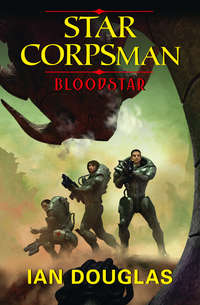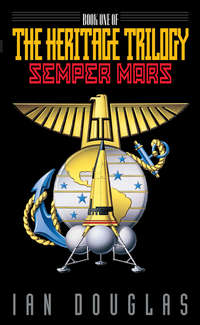
Полная версия
The Complete Heritage Trilogy: Semper Mars, Luna Marine, Europa Strike
He didn’t like Bergerac. The man was a cold fish, and he clearly didn’t like Americans, a dislike made sharper by the current state of cold-war standoff between the United States and the United Nations. Intelligence had reported the suspicion that Bergerac and the three officers traveling with him to Mars were carrying sealed orders of some kind for the UN troops already there, and Garroway was inclined to believe it. The man acted as though he was brooding over some dark and enjoyable secret.
He felt a mild giddiness as the transport pod continued rising up the strutwork tower. There were no windows, so he couldn’t gauge his progress visually, but he could feel the spin gravity dwindling away to almost nothing. Polyakov was designed like a three-bladed propeller on a slender shaft. The strutwork blades supported the hab modules, control deck, and labs some two hundred meters out from the central spine, where one revolution in forty-five seconds mimicked the 0.38-G surface gravity of their destination. On the inward leg of the cycle, the ship’s rotation would gradually be increased to two revolutions per minute, working the Earth-bound passengers up to nine-tenth’s of a G by easy steps.
At the hub of the cycler were the supply modules, fuel, air, and water tanks, the docking bays for cycler shuttles, and, at the end of a long boom extending five hundred meters clear from the rest of the ship, Polyakov’s GE pressurized-water 50 MWe fission reactor.
And, because of the sheer mass of its shielding, Polyakov’s storm cellar was also mounted on the spine, just down the hub from the multiple docking collars, core transport-pod accessway, and main airlock. Only rarely was the big module referred to by its official name, the Radiation Shielded Hab Facility, or RSHF. Usually, it was called simply the “storm cellar,” and with good reason…even if the cycler’s out-is-down spin gravity dictated that Polyakov’s crew had to go up to reach it. Solar flares were infrequent hazards of flight, but when a small patch of the sun’s surface suddenly brightened by a factor of five or ten times, spewing high-energy particles out in a deadly cloud, there was no way that a spaceship en route between worlds—locked by fuel requirements and the laws of physics into its slow-arcing orbit—could turn around and return to port…or even take evasive action, for that matter. The storm cellar was the one compartment aboard ship large enough and heavily shielded enough to give the cycler’s crew and passengers a chance of surviving if they were caught by a bad flare.
It was also, by reason of its relatively remote location, one of the very few places on board a cycler where someone could leave the crowded hab modules and find a little precious privacy….
“Storm Cellar”
Cycler Spacecraft Polyakov
1524 hours GMT
Sex in zero G, David Alexander thought, was wonderful…though it could be even more exhausting than its tamer, gravity-leaded incarnation. The novelty of no up or down, no on top or underneath, as the coupling pair twisted in a thin, hovering mist of drifting sweat droplets, brought an exotic newness to this most ancient of recreations.
Carefully, he leaned back a little, so he could focus on the dozing face of his lovely partner, framed in a golden splash of hair adrift in zero gravity, and as he did, he felt—again—that tiny, nagging pang of guilt. Alexander was married, but not to this woman. It had taken a lot of loneliness—and the rather heavy-handed rationalization that his marriage to Liana was all but over anyway—to get him to the point where he’d surrendered to the very considerable temptation. Mireille Joubert was a beautiful woman and an intelligent one; she clung avidly to the European notion of cosmopolitan maturity that saw nothing wrong with two adults enjoying recreational sex, whether either of them was married or not.
Mireille Joubert. Her first name was difficult…and a delight. She’d had to coach him on the pronunciation, which came out something like mere-ray. He turned his gaze to a drifting wad of clothing a few meters away, remembering fondly how frantically the French woman had shucked off her jumpsuit. Two emblems adorned her suit’s sleeve—a blue UN flag, and a round patch displaying the Cydonian Face. He could just make out the words embroidered around the patch’s rim: Expédition Xenoarchéologique de l’Organisation des Nations unies.
He frowned. There were some who would say that their lovemaking was treason. Well, screw that. Mireille Joubert was his colleague, on her way to Mars to assume her new position as director of the UN archeological oversight team there, a small group of men and women assigned by Geneva to monitor US discoveries and excavations at Cydonia.
He didn’t really give a damn about the political situation, and his only interest in the reports of UN troops on Mars—or of the Marines, for that matter—was to marvel at the stupidity of sending soldiers to the red planet instead of more scientists. He, for one, intended to work closely with his UN colleagues, and the hell with international tensions. Technically, the UN team had no real authority on Mars, though their reports and recommendations could bring political pressure to bear back in the United States on the agencies and foundations sponsoring the Mars digs. Aerologist Dr. Jason Graves, already on Mars with the thirty-some US and Russian scientists on the planet, was the head of the Planetary Science Team. Alexander had worked with the man before and doubted that there would be a problem with his liaison with Joubert. She certainly didn’t seem to think there was a problem with their fraternization.
Alexander started to ease his way from the woman’s sleeping embrace, but the movement set them slowly tumbling, and she opened her eyes. “Mmm. You are wanting to do it again?” Her long, naked legs, clasped about his hips, tightened. He’d thought he was sated, but he could feel the stirrings of renewed interest as she moved against him.
“Do we have time?”
“Quelle heure est-il?”
He knew a little French. She had been teaching him. He glanced at the time display on his wrist-top. “Uh…almost fifteen-thirty.” Shipboard time followed military and European usage, with a twenty-four-hour clock.
“Ah, well…I must go over the site plans with LaSalle at sixteen….”
He sighed. “Perhaps we’d best undock, then.” Zero-G sex, for obvious reasons, had picked up a lot of spacecraft maneuvering terminology. “Docking,” “probe insertion,” and “docking-collar contact” were favorites.
She pulled him closer, nuzzling his ear and enveloping his head in a sweet-smelling, drifting blur of golden hair. Her hips moved in interesting ways. “Oh, but we have much time yet….”
He groaned—happily—then surrendered to warmth and growing hunger. He still felt clumsy with Joubert, even after…what was it? Five times. Or six. He wasn’t sure. Their first time in the storm cellar, they’d used a Velcro strap to keep themselves tied together at their waists; any movement in zero G could have unforeseeable action-reaction repercussions, and when both partners were moving enthusiastically it was difficult to stay docked.
Joubert, though, was an expert at this sort of thing. Either she’d done it before, lots, he thought, or she was a damned fast learner. Superbly acrobatic, she used her legs to keep them tightly joined, flexing knees and thighs like an equestrian to give the necessary friction.
The motion started them turning again, a slow tumble through the mist of their lovemaking. Lazily, he reached out with one arm and caught a stowage-bin handle, checking their spin. Space was precious aboard a cycler. Much of the hexagonal chamber’s interior space was taken up by supply bins anchored by bungee cord and Velcro to the room’s inner surfaces. Fifty or sixty people could have squeezed into the shelter at once if necessary—hab compartments in microgravity acquire a third dimension that makes them far roomier than the same volume of space on Earth—but it would have been a ghastly exercise in claustrophobic conditioning. There were no windows, of course. Ports would have compromised the shelter’s armor. He’d often wished that he could look out into space during one of these sessions….
A metallic thump sounded somewhere close by.
Alexander reared back from Joubert, startled, his heart pounding harder now. The cycler was always noisy, especially here at the hub, where the rotors that kept the hab modules turning provided a constant background hum, and the effects of uneven solar heating on the stationary spine made a sound like far-off thunder. The sounds were muffled, though. Air pressure aboard the cycler was kept deliberately low, which meant that sounds didn’t carry well. This had been close…and very loud.
There was only one thing it could have been—a transport pod docking with the hub spin-connector module.
Shit!…
“Mireille, someone’s coming!” he hissed, disentangling himself. “Quickly! Get dressed!”
Too late. The storm cellar’s hatch leading to the connector mod was already swinging inward. Alexander recognized the lanky, backlit form of Major Garroway crouched in the opening, holding the hatch open but keeping his head primly turned away.
“If there’s anyone in here pulling inventory,” Garroway called loudly, “they’ve got about two minutes before Colonel Lloyd, Lieutenant King, and twenty-six Marines come barging in for weapons drill!”
“Right!” Alexander yelled back. “Almost done!”
Garroway pulled the hatch closed with a muffled clank, and the two of them were alone again…at least for a couple more minutes. They began grabbing for floating items of clothing. His T-shirt was carefully wrapped around the lens of camera sixty-two, mounted on a corner of the bulkhead. He decided to leave it in place until they both were more fully dressed.
With a rattling snort, he forced a sharp intake of air past blocked nasal passages. “What do you think?” he asked the woman. “Is the smell in here too bad?”
Polyakov was the newest of the fleet of four Earth—Mars cyclers, assembled in 2037, but she’d still acquired a zoo of ripe aromas from the tiny, claustrophobic communities that had accompanied her on two circuits from Earth to Mars and back. Fortunately, seven months of living aboard had dulled Alexander to the stench enough that he scarcely noticed anything now…and when he’d entered the microgravity hub of the assembly, nasal congestion settled in and pretty much killed whatever olfactory senses he might have had left.
Despite that, he could detect the heavy muskiness hanging in the hot air, mingled odors of sweat and passion.
“Ohh, David,” the woman said with coy amusement. “How romantic….”
“We don’t want them to know, do we?”
Joubert gave a delicate shrug, then folded her knees to her bare breasts and slipped both legs at once into her red panties. “And if they know,” she said, “it is that they will simply be jealous, yes?”
“I’d kind of like to avoid that if we can,” he said, reaching for white briefs adrift in the air.
She smiled, playful. “Ah. You are afraid your wife finds out?”
“It’s not that.” Well, not entirely. At the moment, he was more afraid of the teasing he was likely to get from the other Americans aboard Polyakov. Four Team scientists, plus thirty US Marines, and the one Navy guy, Reiner, who was with the ship’s regular crew. That was a hell of an audience.
The compartment tumbled lazily about his head. He had his underpants on at last, but he was having trouble imitating the woman’s casual flexibility with the coveralls, and he kept getting both feet tangled in the same leg hole. Damn it all. You’d think that after seven months he’d have managed to learn how to dress himself….
Well, to be fair, he’d not had to dress in microgravity except for the few times he’d come up here with Joubert, one of the distinct advantages of having spin-gravity hab modules. How was it that she could be so graceful with no more practice than he’d had? Already dressed, she anchored herself from a handhold on the bulkhead, then grabbed his shoulder to brace him as he finally slid into the garment and zipped it up. Moving to the bulkhead, he untangled his T-shirt from the camera lens and switched the unit’s sound back on. Swiftly, then, he used the T-shirt as a towel, trying to soak up some of the swirling mist of various bodily excretions in the air.
A second clang sounded from the next compartment. A moment later, the hatchway banged open and a file of Marines in Class-Three armor began crowding boisterously through into the long, hexagonal chamber.
“Fall in! Fall in!” one Marine was shouting. He wore a gunnery sergeant’s chevrons on his sleeve.
“Whee-oo!” another shouted as he squeezed through the hatch. “I do believe I smell fresh puss—”
“As you were, Donatelli!” the gunny sergeant, catching sight of Joubert and Alexander before the others did. “There’s a lady present!”
“Surely ya don’t mean me, Gunny,” a hard-muscled woman Marine growled as she pushed into the compartment.
“He said ‘lady,’ Caswell. Not hormone-junky.”
“Screw you, Marchewka.”
“Silence! Fall in at attention!”
The crowd fell uncomfortably silent after that, each Marine grabbing on to a handhold to anchor himself more or less in line with the others. Alexander eyed them with distaste…ten or fifteen men and women who were suddenly making the storm cellar as confining as the inside of a walk-in safe. They carried rifles and wore partial armor—breastplates and open helmets, worn over dark green BDUs. The breastplate shells were made of an artificial laminate that took on the color of its surroundings, but that hadn’t stopped most of the Marines from customizing the things with some artistic touches of their own. Mange la merde was scrawled in red on one Marine’s armor. Dirty UNdies read another. Alexander scowled. No wonder America’s relations were so bad with the rest of the world, if these were her ambassadors.
Alexander decided that he and Joubert had better clear out before the way was completely blocked. He took a last, surreptitious look around to make sure there wasn’t any clothing adrift, then started moving toward the hatch. Joubert followed.
“Gangway, people!” the sergeant snapped. “At ease and make a hole! Civilians comin’ through!” The line of Marines hauled themselves back out of the way, giving the two of them just enough room to squeeze past. Released from attention, several Marines whispered among themselves, and someone giggled.
“Uh…excuse me,” one called out, “but did one of you lose something?”
Alexander paused at the hatch, turning in time to see a lacy, bright red bra drifting past the faces of grinning men and women. Joubert, with far more aplomb than Alexander was feeling at the moment, snagged the garment, and darted ahead through the hatch. Alexander followed, clumsily, as laughter exploded behind him.
In the connector module outside, Alexander came face-to-face with Major Garroway, who was clinging to a bulkhead beside the transport-pod hatch. The module, which was locked to the rotating hub collar, was turning slowly with a heavy, grinding sound, though here at the very center of rotation, the spin gravity at the walls was still practically nonexistent. According to the lights on the control panel, a second pod was on the way, carrying, no doubt, the rest of the MMEF section. The pods, which worked in tandem like Swiss Alpine elevated cars to preserve the cycler’s spin, could carry only about fifteen people at a time. The second car would be here any moment, and then things would really get crowded.
With a loud clunk and the hiss of matching pressures, the second pod arrived, and the hatch opened up. Another line of lightly armored men and women spilled out, moving rapidly across the module toward the storm-cellar hatch. Last out was a tall, ebony-skinned Marine in fatigues, wearing the silver eagles of a full colonel at his collar. “What are you doing here?” he demanded, glaring at the two civilians.
“Uh…inventory, Colonel Lloyd,” Alexander replied. “Just…uh…checking the stuff the arky teams’ll need at Cydonia.”
Lloyd gave them a single brief, penetrating, and disdainful look, then followed the rest of his men into the cellar.
Alexander let the major and Joubert clamber into the waiting pod ahead of him. From the still-open door of the storm cellar, he heard Lloyd’s familiar bellow. “All right, people. Enough skylarking!”
The cellar door boomed shut, cutting off the voice. Alexander clambered through the pod hatch and grabbed a handhold next to the major.
“Thanks,” Alexander told him. “For the warning, I mean.”
“Yeah.” Garroway’s voice was hard and cold. His eyes were on Joubert…or perhaps it was the UN flag on her sleeve he was staring at.
If he doesn’t like it, Alexander thought viciously, then screw him!
Alexander hated the very idea of US Marines on Mars, hated the politics, hated the twisted, jingoist, nationalistic interests that pretended that such things were necessary. They had come to Mars to do science, vitally important science, with the discovery of the Cydonian ruins, and troops were only going to get in the way.
Well, maybe they’d be able to ignore them. After all, it wasn’t like there was a war on.
TWO
VIDIMAGE—JANICE LANGE AT NET NEWS NETWORK ANCHOR DESK.
LANGE: “In Geneva, today, President Markham concluded his fifth straight day of talks with UN Director General Villanueva, announcing that, although much work remains before the outstanding differences between the United States and the United Nations can be fully resolved, he is confident that real progress is being made.”
VIDIMAGE—THE PRESIDENT ADDRESSING A CROWD OF REPORTERS AND NETHAWKS.
PRESIDENT MARKHAM: “The United States of America is not now, nor has it ever been, engaged in any plot or cover-up involving the Martian artifacts. The joint US-Russian expedition to Mars is carrying out its research and investigations for the benefit of all humankind. We welcome the presence of UN observers and scientists at Cydonia. We welcome their assistance. The discoveries made there so far are…are astonishing in their implications for humanity, for everyone on this planet, and there’s enough work there that needs doing for us to be very happy when anyone offers to lend a hand.”
VIDIMAGE—DEMONSTRATORS OUTSIDE THE UN HEADQUARTERS SHOUTING, WAVING FISTS, AND DISPLAYING SIGNS READING “US MILITARY OUT OF SPACE!” AND “ALL POWER TO THE UN!” LONG SHOT OF PRESIDENT MARKHAM LEAVING BALCONY AS SOME DEMONSTRATORS THROW STONES AND UN POLICE STRUGGLE TO MAINTAIN A PERIMETER.
LANGE: “Large numbers of demonstrators protested the president’s Geneva visit outside UN Headquarters.”
VIDIMAGE: A PROTESTER, A WOMAN WITH A SIGN READING “US STAY HOME.”
PROTESTER (in translation): “America’s been grabbing the world’s resources for years! Now they’re trying to rape the other planets like they’ve raped the Earth! Well, we’re here today to tell them that we’re not gonna stand for it anymore!”
VIDIMAGE—JANICE LANGE AT TRIPLE-N ANCHOR DESK.
LANGE: “In other news today, Secretary of State John Matloff rejected as ‘absurd’ renewed calls for a UN-mandated plebiscite to determine the political future of the American Southwest. Representatives of the Hispanic America Alliance told reporters today that there would be no peace for America until the formal creation and recognition of the nation of Aztlan.”
VIDIMAGE—RIOTERS IN DOWNTOWN LOS ANGELES OVERTURNING A POLICE CAR AND THROWING STONES, AS TROOPS MOVE IN BEHIND CLOUDS OF TEAR GAS.
LANGE: “HAA members seek the creation of the new state from territories in Northern Mexico and from the states of California, New Mexico, Arizona, and Texas. Armed confrontations in the region between HAA protesters and military and police authorities have so far resulted in at least two hundred deaths….”
WEDNESDAY, 9 MAY
Cycler Spacecraft Polyakov
1546 hours GMT
“How’s it working now?” Garroway asked, slipping into the seat on the control deck next to Reiner. He didn’t like microgravity and was glad to get back to a place where up was up and down was a place you could sit.
The Navy astronaut looked up at the monitor. “Seems to be fine, now. Vid and sound.” He cocked an eyebrow at the Marine. “Underpants?”
“T-shirt.”
“Man, nice work if you can get it. Who was it?”
“Doesn’t matter,” Garroway lied.
It was an open secret with the cycler’s crew that passengers frequently used the storm cellar as a place for some precious, hard-to-get privacy. Different commanding officers handled the problem in different ways. Many continued to adhere to the old policy, born of NASA’s long-standing dread of bad publicity, of forbidding sexual liaisons during extended space missions; others reasoned that liaisons were going to happen no matter what the rule books said, and so long as they didn’t create problems for the crew or mission as a whole, they were probably best ignored.
Normally, Garroway wouldn’t have been interested in how the other cycler passengers passed their too-plentiful free time, but he was still angry at the realization that the storm cellar’s occupants this time had been Alexander and the Joubert woman. Damn it all, the political situation was confused enough right now, without those two attempting their own brand of détente.
Reiner was obviously still interested in the identities of the two up in the cellar, and Garroway decided he wanted to avoid the issue. He moved his chair so that he could peer across Reiner’s shoulder at the screen. “Let’s have a look.”
Colonel Lloyd was floating at the far end of the crowded compartment, while the enlisted Marines were gathered into two lines running the chamber’s length. Their torso armor had almost perfectly blended with the white bulkheads, with random, dark olive streaks where the active camouflage was picking up arms and legs from nearby Marines. Each Marine had his or her assault rifle hanging in the air in front of him, together with a small cloud of metallic pieces, rods, springs, and oil-glistening parts.
Reiner turned up the gain on the volume. “…faster, people,” Lloyd was saying, his voice a drill-field growl. “Faster! The enemy is not gonna wait for you. Pick it up, pick it up!”
Hands flew as the Marines snatched pieces out of the air, each movement precise, smooth, and almost machinelike in its control. They appeared to be reassembling their rifles, and the number of floating stray parts steadily dwindled.
One Marine, Staff Sergeant Ostrowsky, completed the drill and brought her assembled rifle to port arms with a sharp slap as her hand smacked the plastic stock. Two more finished up—slap-slap!—an instant later, and then all of the Marines were bringing their rifles up to signal completion in a ragged chorus of skin on plastic. It was a remarkable demonstration, Garroway thought. In microgravity, even the slightest movement tended to give you a push in the opposite direction, and many rapid movements could accumulate a lot of drift or spin if you weren’t careful. The Marines of the MMEF appeared to have mastered the art of balancing move with move to keep their bodies more or less motionless.
Lloyd waited until the last Marine snapped home the bolt and brought the weapon to port arms, then touched a button on his wrist-top. “Not good enough, people,” he growled. “Not good enough by thirty seconds!”
“Damned robots,” Reiner said. When Garroway looked at him, he shrugged. “Sorry, Major, but it seems like such a waste. Like close-order drill, you know? Great back when armies lined up in nice neat rows and had to go through loading and firing by the numbers, like two or three hundred years ago, but pretty useless in a modern war.”
“I’d say it’s a pretty good exercise of self-control and discipline, wouldn’t you?”
Reiner chuckled. “Well, the next time I need a rifle stripped down and put back together in zero G, I’ll sure as hell know who to go to. Shit, why’s he making them wear armor in there? O1’ Poly’s been around her circuit two and a half times, now, and she hasn’t been attacked by space pirates once!”









